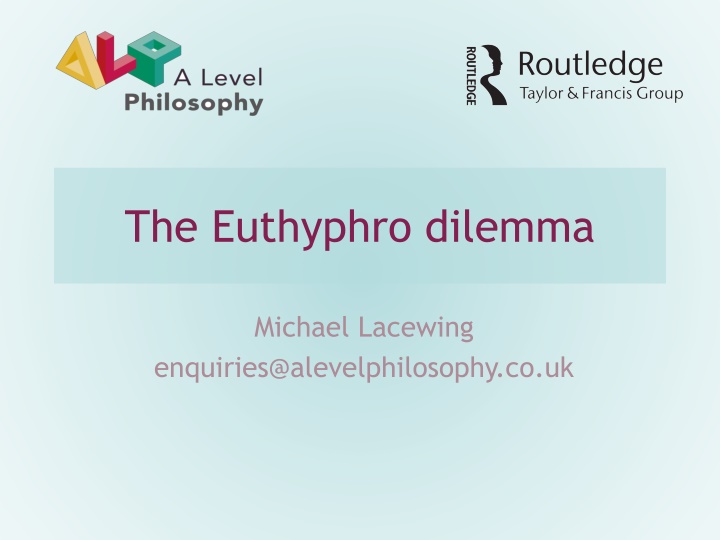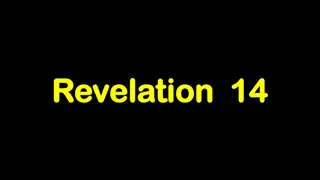The Euthyphro dilemma
The Euthyphro dilemma explores whether morality is dependent on God's will or exists independently. Can God make right wrong, or is morality fixed? This philosophical debate questions the nature of morality and its relationship to a divine being.
Download Presentation

Please find below an Image/Link to download the presentation.
The content on the website is provided AS IS for your information and personal use only. It may not be sold, licensed, or shared on other websites without obtaining consent from the author.If you encounter any issues during the download, it is possible that the publisher has removed the file from their server.
You are allowed to download the files provided on this website for personal or commercial use, subject to the condition that they are used lawfully. All files are the property of their respective owners.
The content on the website is provided AS IS for your information and personal use only. It may not be sold, licensed, or shared on other websites without obtaining consent from the author.
E N D
Presentation Transcript
The Euthyphro dilemma Michael Lacewing enquiries@alevelphilosophy.co.uk
The question Is morality whatever God wills it to be or is morality something independent of God? Can God make right be wrong, or good be bad?
The first option Morality is independent of what God wills. To be good, God s will must conform to something independent of God. God wills what is morally right because it is right. If correct, God is not omnipotent, because God cannot change morality.
The second option Morality is whatever God wills. What is morally right is right because God wills it. If this is right, if murdering babies were commanded by God, then it would be morally right of us to murder babies. This violates our sense of morality. It would not be right to murder babies even if God commanded it.
Dilemma The answer must be one or other of these options. But both face objections. So is our concept of God, e.g. as both good and omnipotent, coherent? (Assumption: morality is not subjective. It is wrong to murder babies If God exists, it is highly unlikely that morality is subjective.)
Is morality independent of God? Can what is good change? Or must what is good be good? If it is logically impossible to change morality, then morality is no limitation on God s omnipotence. But why think moral truths are necessarily true? Murdering babies is right isn t a contradiction So what could make it impossible for an omnipotent being to change morality?
Morality is arbitrary If morality is dependent on God, whatever God willed would be morally right Killing babies? If God willed it? There are no reasons for God to will what he does: if God invents morality, there are no moral reasons for actions before God wills an action Reply: God s will is guided by God s love Obj: this makes love the standard of morality Reply: no, God s love so nothing independent of God But is God s love arbitrary? Could God love something different?
Properties and concepts It is not an analytic truth that God is good. God and morally good are different concepts. However, goodness is the same property as what God wills. Compare: It is not an analytic truth that water is H2O . Water and H2O are different concepts But water is identical to H2O. Good = what God wills, not conceptually but metaphysically
Knowledge and reality But unless we have an independent standard of goodness, we cannot claim that God s will and what is good are the same thing. True, just as we can only judge that water is H2O if we have some independent idea of what water is. But this doesn t show that water is not H2O. So we need some reason to think that morality is what God wills, but that doesn t show that they are distinct.























